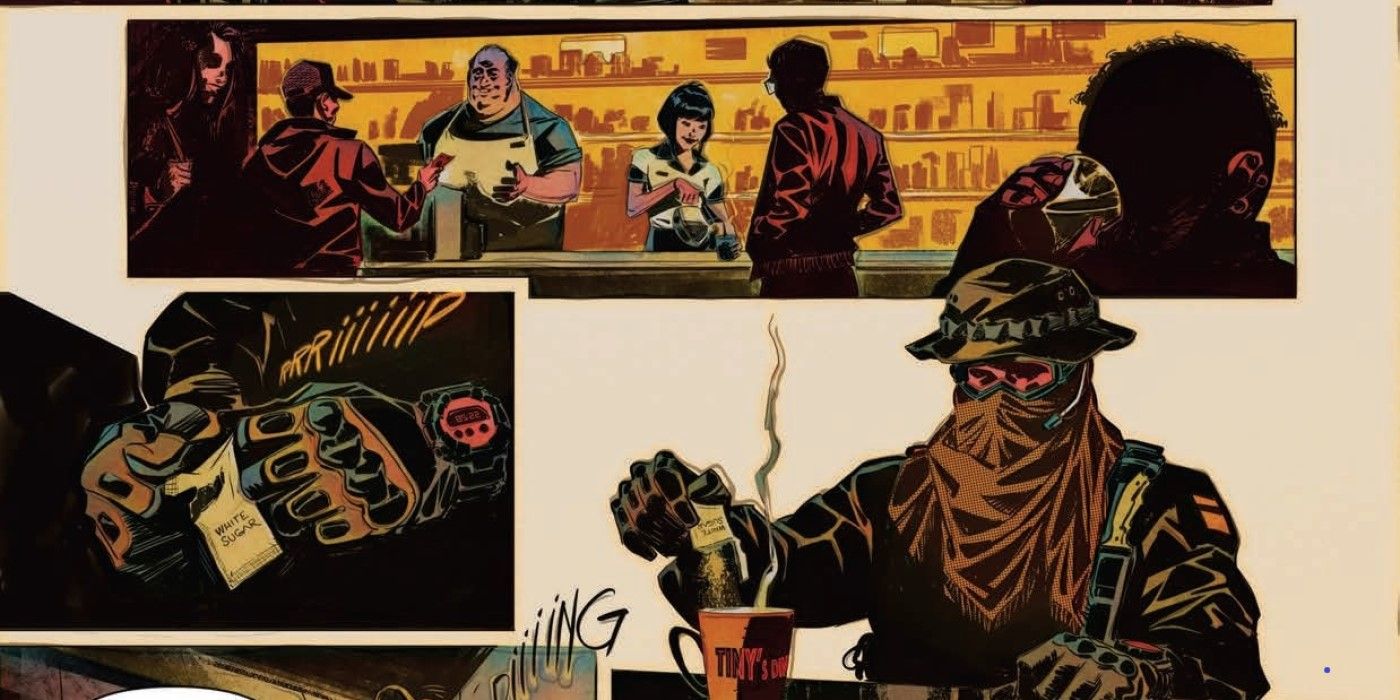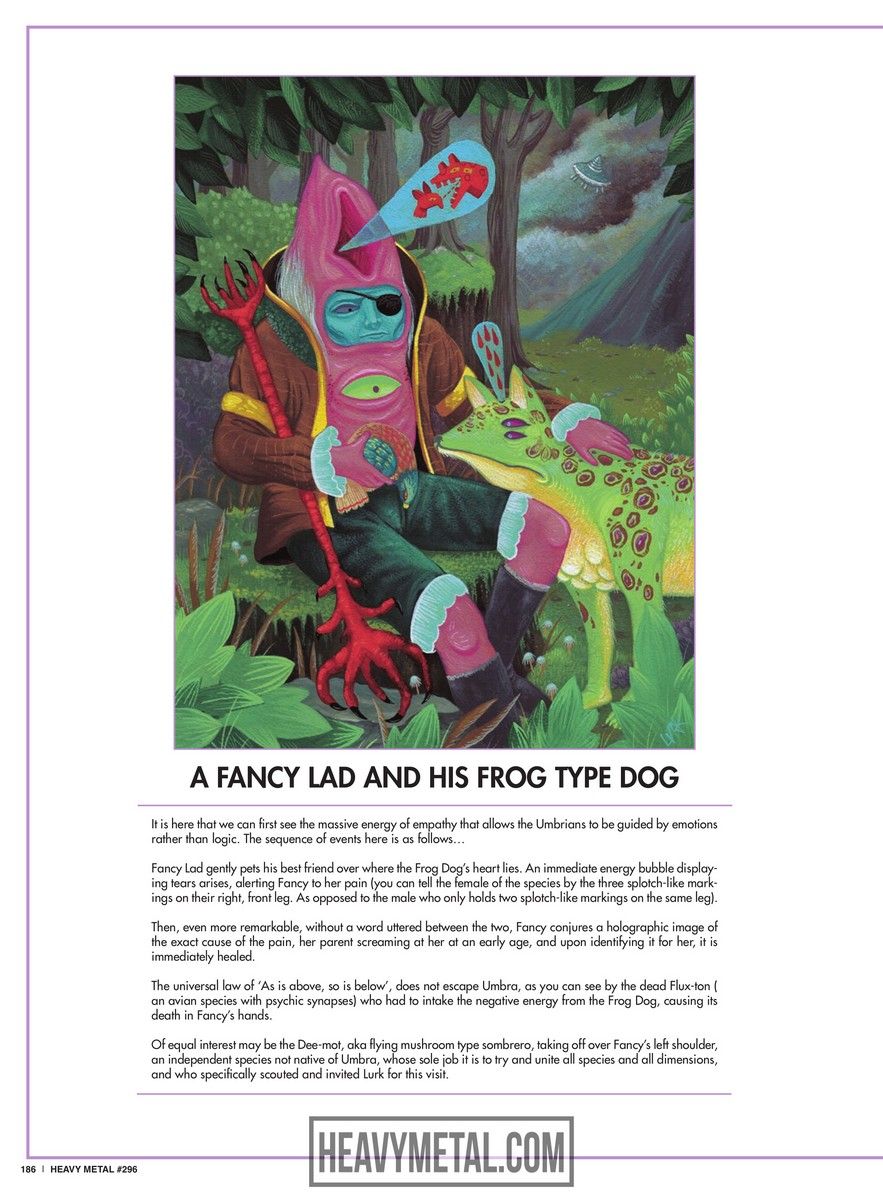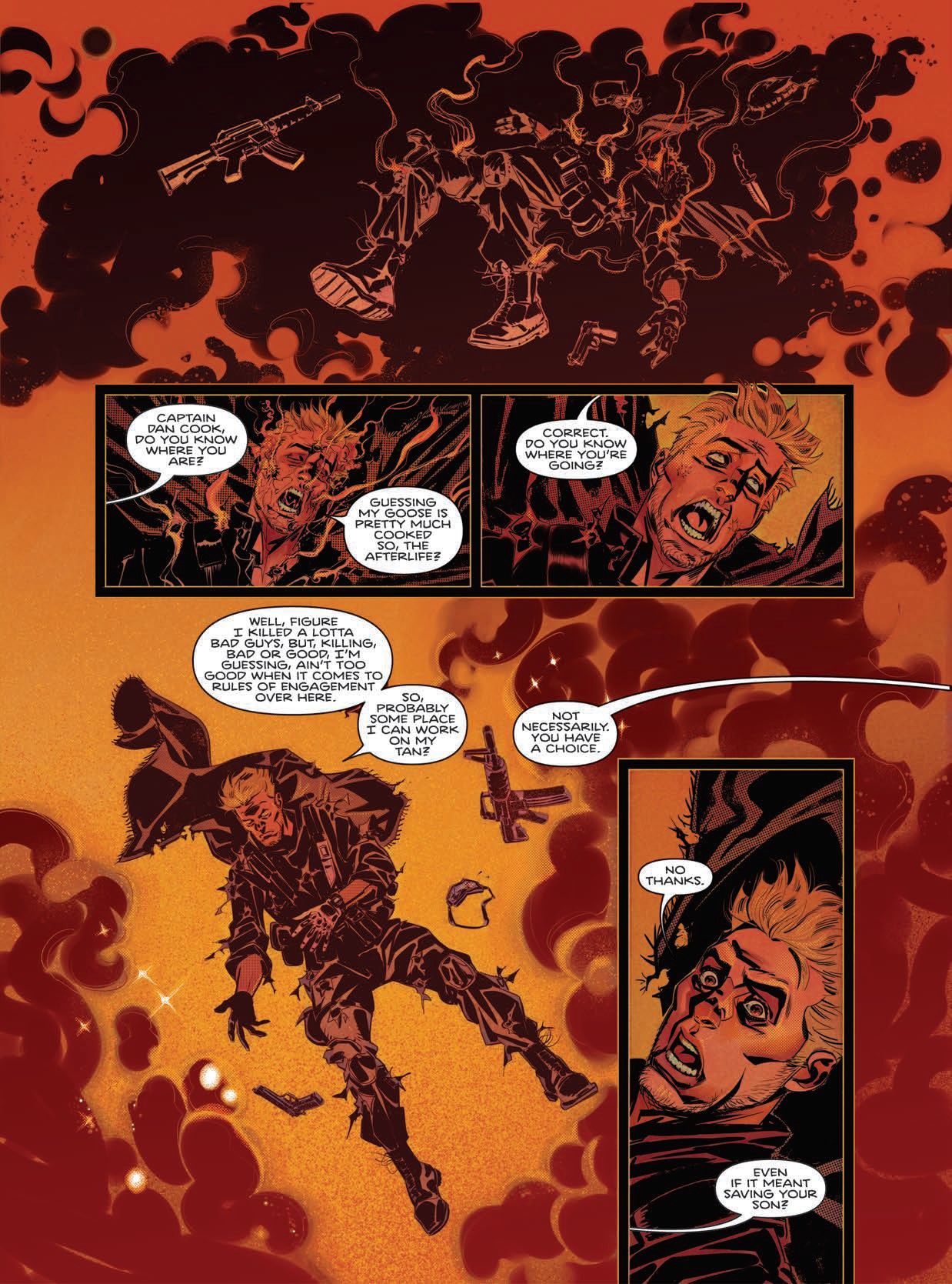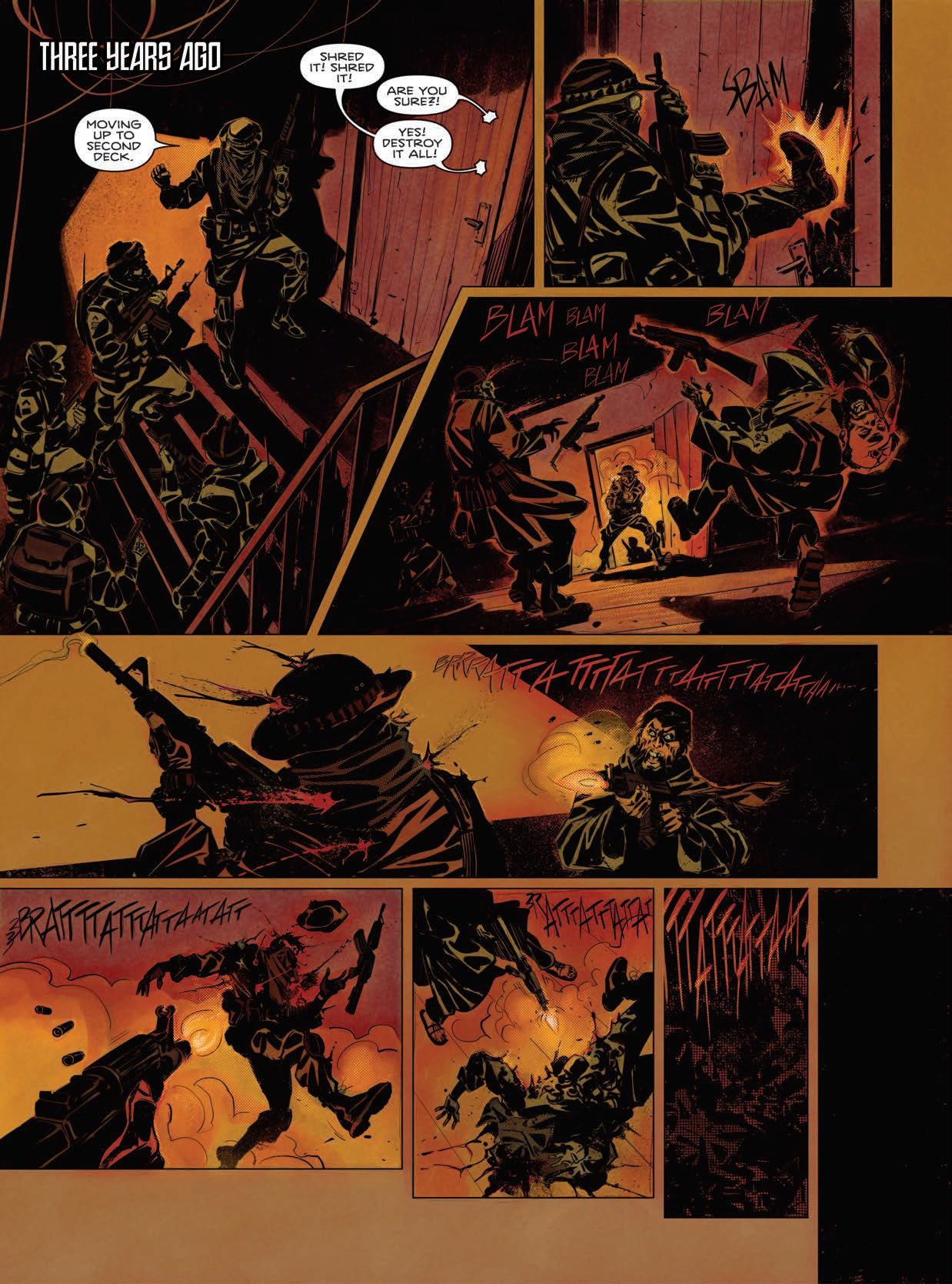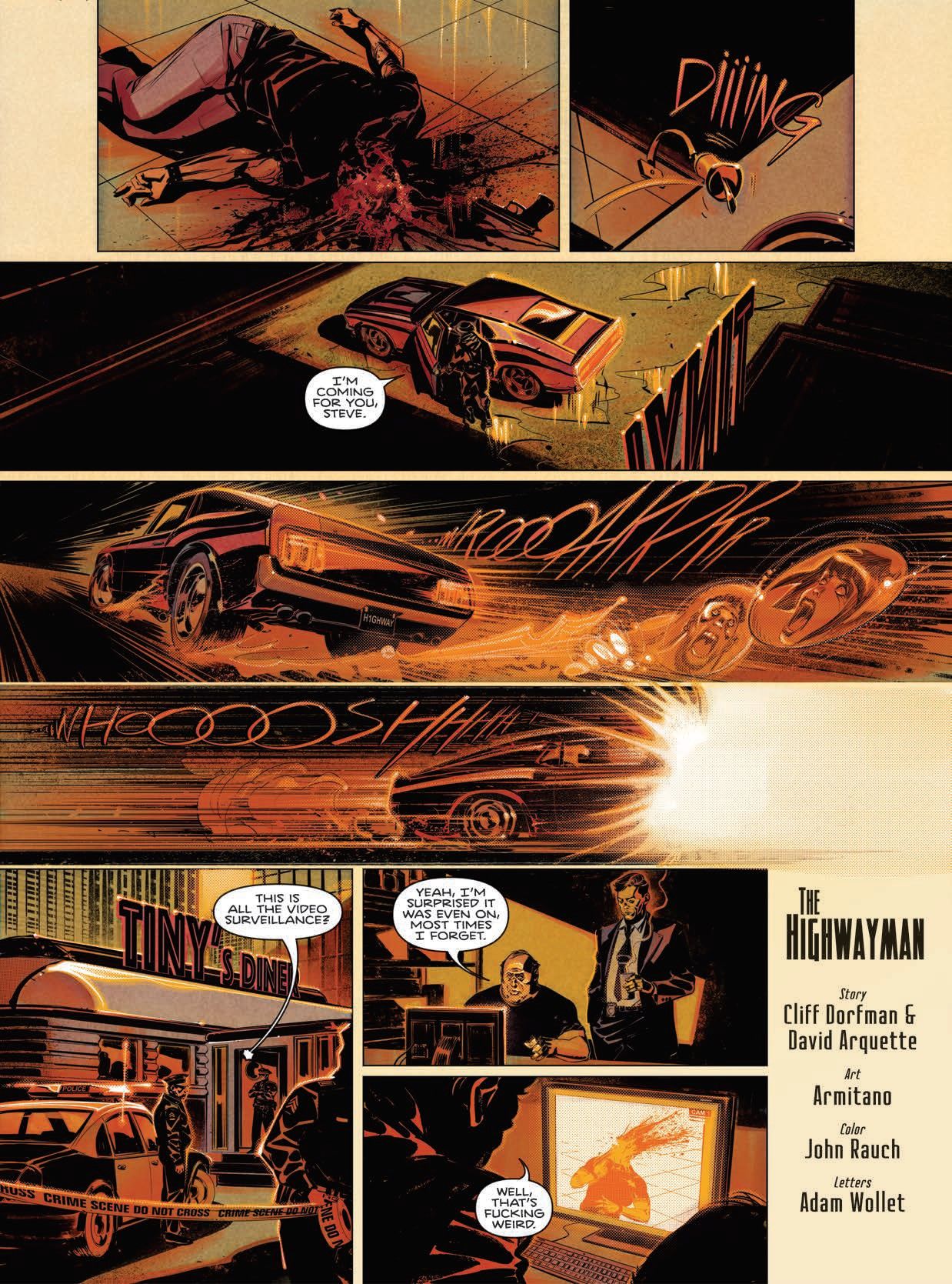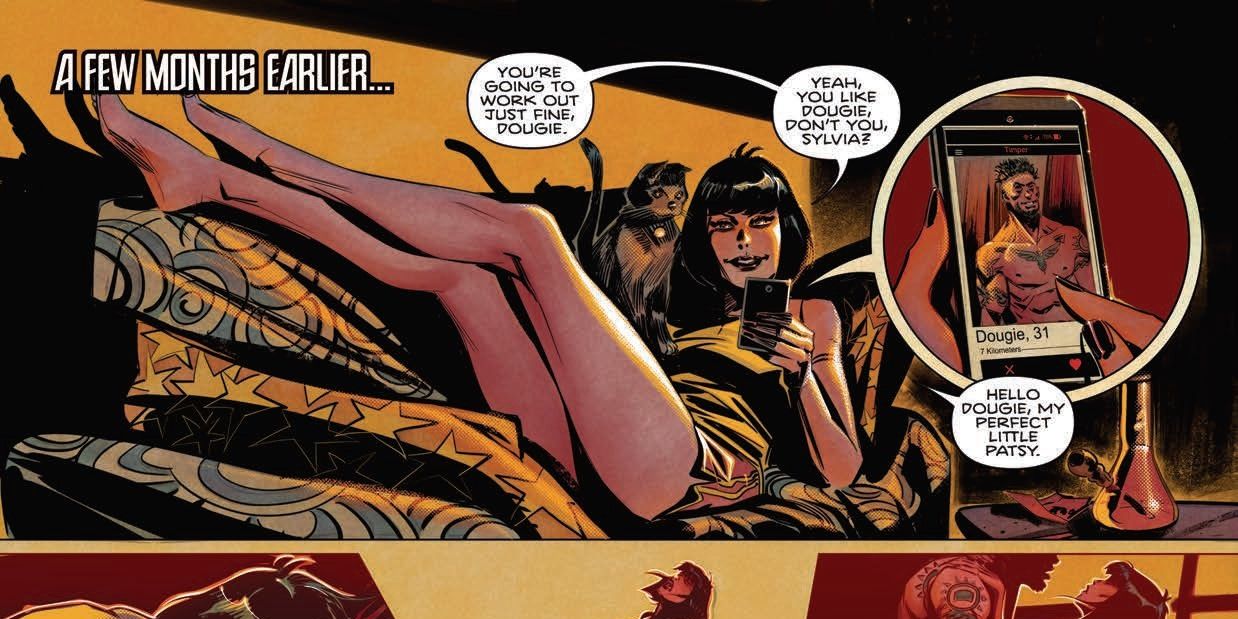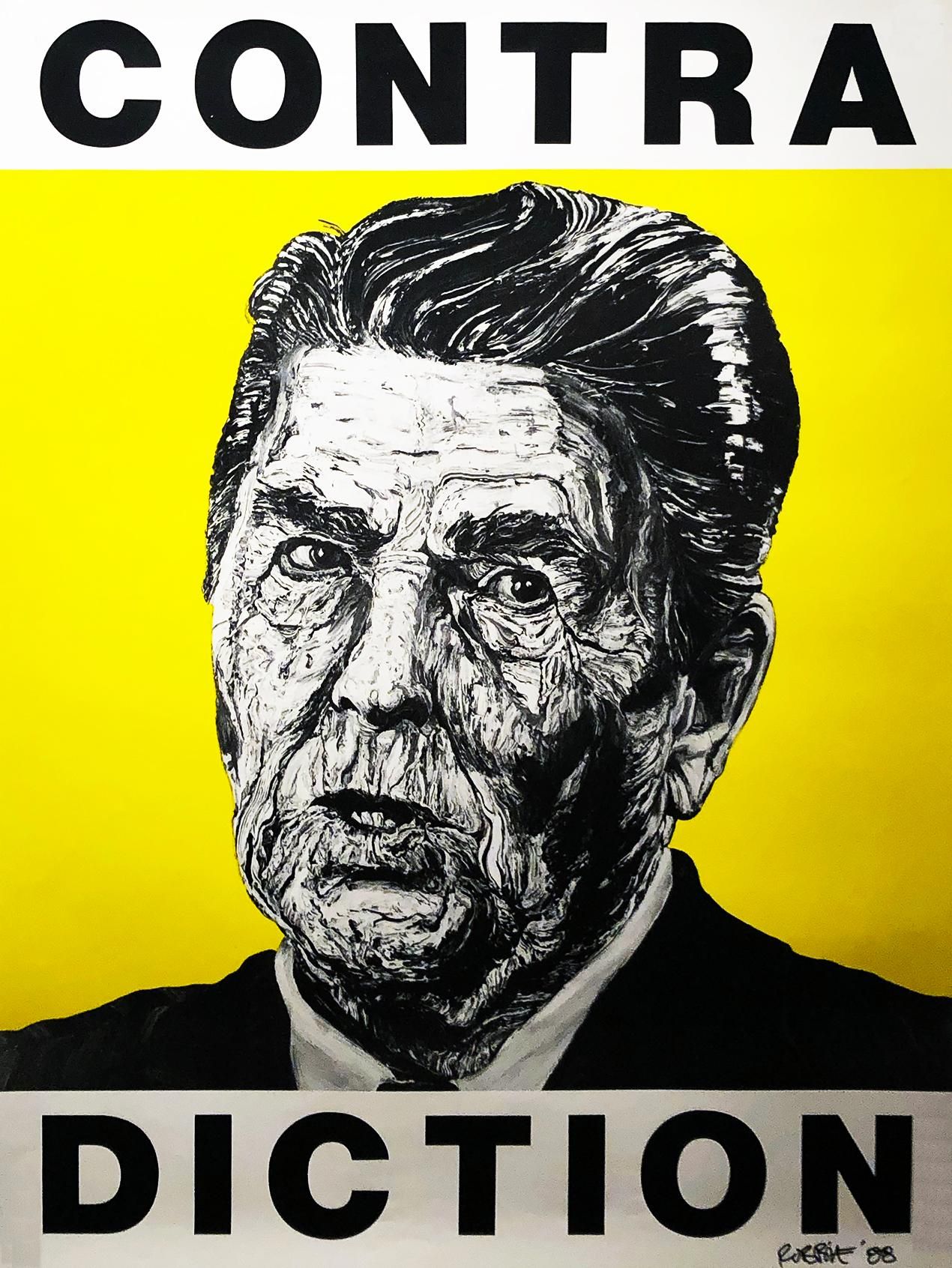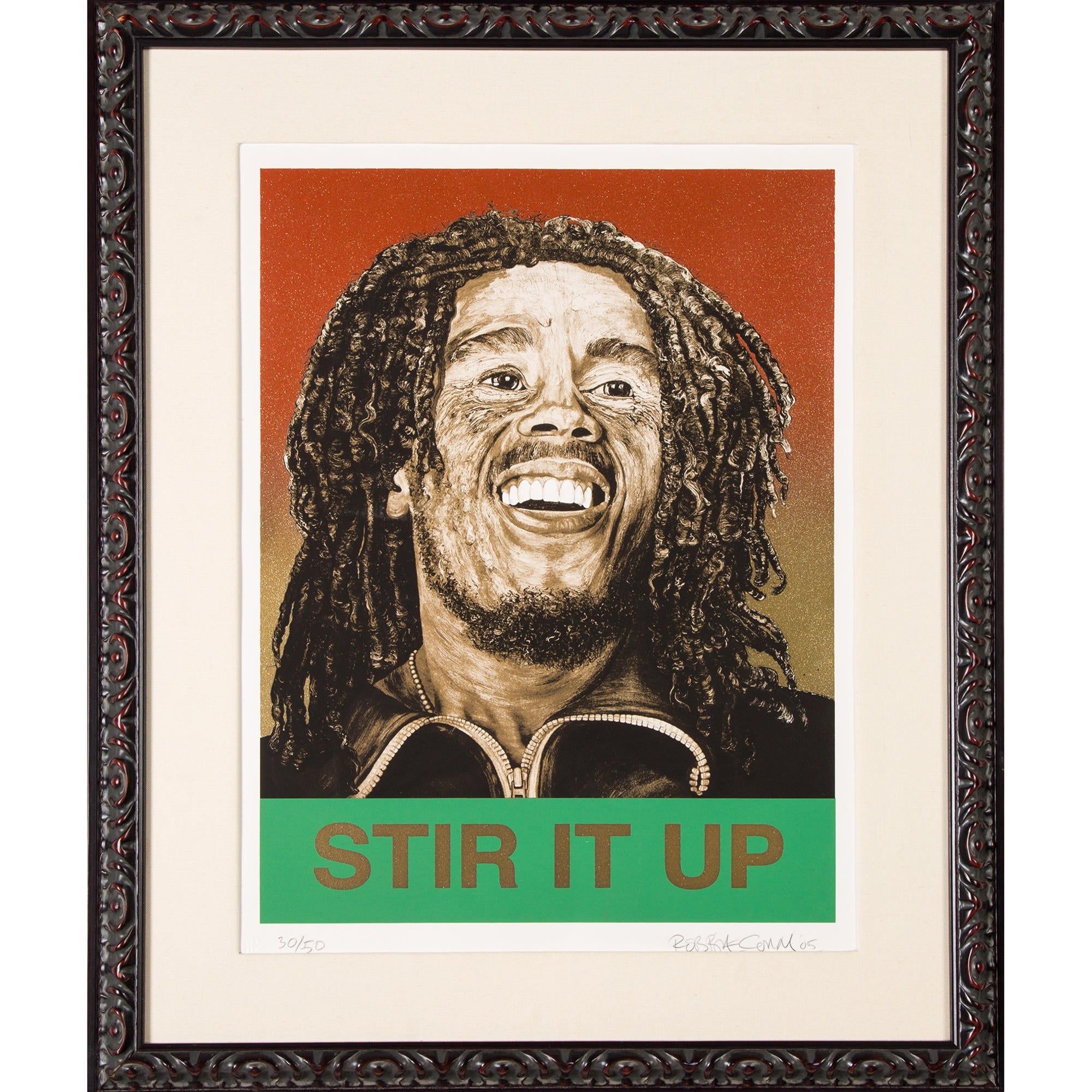Heavy Metal's 'The Highwayman' is a MATURE comic
With all the terrible news of crime and corruption run amuck in today's headlines, one might be forgiven for hoping there was some invisible force or karma that kept the scales of justice level. Enter Cliff Dorfman (Entourage) and David Arquette (former co-star of screen legend Marlon Brando and wrestling champion), the writing partnership behind the new pulp hero strip The Highwayman in the pages of Heavy Metal Magazine #299 this month. A psychedelic, gritty and somewhat frightening moral fable, "The Highwayman" hits all the right classic Heavy Metal beats.
An avenging angel of karma, The Highwayman is former Special Forces soldier Dan Cook, who, after meeting a grisly end, is tasked by the powers that be to take the souls of the wicked before they commit violent acts upon the innocent. Only the first offering of this antiheroic avenger, Screen Rant sat down and spoke with the creative team about their somewhat trippy storytelling philosophy and future plans with Heavy Metal.
Screen Rant: Can you tell me a little bit about how you came up with this character, The Highwayman?
Cliff Dorfman: Well I mean, David and I have been working together for so long it’s like second nature to have an idea and then I call David and I’m like, ‘hey I have this really great idea, it’s about water drops in the back of a fastback of an Eleanor and there’s souls in the water drops.’ He’s like ‘yeah, we have to make that relatable.’ I’m like, ‘ok, so what if the souls in the drops were like, he’s collecting the souls’. And then Dave is like, ‘yeah… like, karma’.
And I’m like, ‘ok, yeah, what if we wrapped karma in an American flag, and it was this special ops guy.’ He’s like ‘yeah, but it’s gotta be a choice... something has to happen with his kid.’ That’s how this gets born. And then all of sudden we start writing it, we have a proposal and luckily we had done another piece for Heavy Metal with an artist named Lurk [entitled "The Land of Umbra", featured in Heavy Metal Magazine #296] that David was very familiar with-
David Arquette: Yeah, I love him.
Cliff: Love. And we had an open door there, and we pitched it to ‘em, and they loved it and they were like ‘great’! And now we’re here.
David: [Heavy Metal Contributing Editor] Justin Mohlman was amazing. I saw him at Comic-Con and he’s an incredible guy. He works at videogames, works at Heavy Metal, and they had done a magazine for Creepshow, and I was in the Creepshow, so he’s like ‘hey man, we just did this’ and we got to know each other, we stayed in touch. Then we did this first thing, sort of a virtual, not really virtual, like gallery tour or like a tourist’s explanation of this man, Lurk’s, art, and it was really fun. I just love working with Cliff. We’ve always done incredible, fun stuff together. We’ve written a script that took us nine years, so like, ten years ago?
Cliff: And I think we’re going to see it in Heavy Metal soon, as we’ve finally found the way to- but we can’t talk about it.
SR: We can talk about all that later. [Author’s note: we do]. This piece features a mind-blowing twist where you managed to make it both so obvious and so nuanced that the pay-off at the end, where you’re just like ‘darn, that is karma’, feels like classic Heavy Metal. Clearly we all kind of wish the world was like that, a natural force of karma protecting us, but it’s not. There’s almost a strange, twisted idealism to the whole thing.
David: That's true.
Cliff: We have this thing and, especially for me, I go to Davey with this all the time. Davey’s all about love, and I was very much until recently all about justice. So it becomes this dichotomy between ‘I want revenge’, and Davey going ‘yeah, but you have to understand and love them’. So, we get to this place where, with Heavy Metal, and I think Matt Medney has done an amazing job in coming in and trying- not trying, actually taking Heavy Metal into, like you said, classic Heavy Metal [territory]. And that’s what the overseeing and the slight editing they did there with Matt and everybody was, to make sure we had that Heavy Metal spin on it.
David: Y’know, one of the coolest things in just sharing it with a couple close friends were that they were like ‘I want to see more!’ but the whole idea of this piece is to tease out this world that’s in our head. Yeah, the world isn’t really like that, but it’s funny, when you said that, it brought up this thing that happened to me yesterday where, out of nowhere, I had seen this donkey in an antique store. And I took a picture, and I sent it to this director who I did a movie with, who had a donkey in the movie, and we had all these jokes about, ‘hey, you’ve got a great ass’ and all this stuff. The donkey’s a main [part]. I had a whole scene where I get drunk with the donkey. It’s called Amanda and Jack Go Glamping. So, I took a picture and I sent it to the guy and I said ‘love you, and I’m thinking about you’. And he goes, ‘oh my god! As soon as you sent that, a guy walks by with a boom box that’s playing [The Cure's 1979 hit] “Boys Don’t Cry”! And in the film, I sing “Boys Don’t Cry”. So, it’s little nuances like that that make me think, ‘well…'. It’s all The Simpsons stuff. They’re incredible about predicting the future.
Cliff: Yeah, Nostradamus.
David: But there’s other things going on in this world that we have no idea what the physics and science, and everything behind it, and metaphysical nature of it [is]. So, I think we like to explore some of that. We like to play with it, y’know? And there are just things about life where-
Cliff: In exploring things like this, it’s also very interesting to explore what 'bad' is. In other words, if you have a special operator whose been doing this for 20 years and he’s going out there and “killing bad guys”, he’s still killing people. And where’s the line that you draw? So if there’s a collective consciousness, an afterlife, whatever you want to say, then what happens there? How does that line get divided and how can you pay for the bad but still, you know, get rewarded for some of the good that you did, if you did help, if killing ever helps, which, again, that’s where the line gets drawn and hopefully we try to put the reader, in seven pages, in the middle of that argument.
David: Yeah, I know totally, but it’s also like Hitler. Evil person, we go in there, we get him, we fight the Germans and everything, and then we’re the good guys, yeah? But everybody’s murdering each other, you know what I mean?
Cliff: Yeah, to get to that goal.
David: Yeah, and in this sort of thing is: so, how does God do evil? (laughs) You know what I mean?
SR: Oh, Jesus.
David: So he's this mercenary-kinda character whose goodness is vauger than most people's.
Cliff: Than his kill count.
SR: You’re talking about this nebulous idea that, ‘yes it’s all random, we can’t put this idea that there’s a plan all in there.’ But there seems to be different kinds of causality that one casually notices from time to time. Nietzsche called it eternal recurrence. That’s a bit of a Heavy Metal idea, y’know, ‘is there fate, and if there is fate, does it mean anything?’
David: I don’t know. Fate’s such an interesting and bizarre one, because we have our own will, so we can "off" ourselves, that I suggest no one ever doing that. But we can also-
Cliff: We can make choices.
David: We can make choices. We can do good, or we can do crazy shit, whatever it is. So, how does that all work? I don’t know! Fate and destiny? I don’t know! It’s all the kind of stuff that we explore in art to try to just grasp ‘what the hell are we doing here?!’ That’s all I want to do.
Cliff: It’s an interconnectedness as well. I think, to the point that David’s talking about, is that this interconnectedness that we break off from and we become these individuals. You know, the ‘I am’ idea. And as we move out of that, and we start to realize that we’re not individuals, and ‘I am’ really is something that really came from an all, then you have to start to wonder about fate. Then you have to start to wonder about how the choices you’re making, your fate, your destiny, or ‘you’re just random, and you’re able to make those choices’. But eventually they catch up to you.
David: Yeah.
Cliff: And to me, again, that’s why I fucking love Heavy Metal. It’s because we get to have some justice. I get to say ‘ok, so here’s a guy, he’s a special operator’, and Davey goes ‘yeah, so he dies. What happens?’ Ok, he dies, he has to make a choice and that’s where it’s fate and free will. So his free will was to be in the Special Forces and to kill these people who he’s killed that were “bad guys”. The fate was, ‘nah, you did some good, but now you’re gonna have to pay for that’. And there’s justice all around. And then these really bad people now get to get taken out, which is always fun.
SR: You've created a moral parable in "The Highwayman", taking all of these super hero-y ideas and mixing them together into a successful pastiche. Tell me a little more about this moral parable as you want to see it unfold.
Cliff: I know when David and I have talked about this in moving forward in the comic book, which we hope we get to do, is that there’s a lot of areas that are very timely where we can go in and start collecting souls and making people very happy. Y’know, at least they can see it on a page, right Davey?
David: What you were talking about earlier about connected and all that, I always find it really interesting in music specifically. I mean, it happens with the actors too and artists in general, but with music it’s more obvious, because it’s like Bob Dylan goes on this run where he is just channeling something super, like *explosion noises* and it’s just blowing out of him. And then, I mean he’s still doing great music and everything, but it’s not the same, y’know? You’re no longer connected. And I see it with actors too where you can kind of lose your way, and I feel like that’s a lot like with life, you kind of have to stay grounded, you have to stay connected to it, you can’t lose focus. I see some of these people in Hollywood and I just- I don’t know. And listen, I lose my way a lot too, but when you can go from any sort of world and just flow into it and still kind of stay grounded and stay a part of it without being above it or so far away that you become a cartoon of yourself.
SR: It’s about humility.
Cliff: Yeah, that’s good. It is about humility. What I got from it, I got to tell you, is that I think we’re going to have to take out some people in Hollywood in the next episode. Highwayman might end up in Hollywood.
David: (Laughs).
SR: Are we plotting a murder here? Oh my god!
David: No, just for people who deserve it. I mean, it’s not murder. Karma, dude, karma. They were gonna get it anyway…
Cliff: We had no say, it’s karma.
David: The sad thing is that, like, my personal belief is that none of it really matters anyway... what happens when God gets bored? Like, all of this? And I also don’t like everything going on. My beliefs... I used to believe in capitol punishment, and then my friend sort of talked me through it, and then I was like, ‘oh yeah, that makes a lot of sense’ and now I’m completely against it. I can’t even imagine it. And- I have a crying baby coming my way.
SR: Aaaaaaaay.
Cliff: So you’re just saying you got softer?
David: (As the noise of a small child echoes in the background) Yeah…
Cliff: I’m the same way. I used to look at a movie and say ‘oh, they used that kid as a device. Obviously, they had to kidnap the kid, and then we’ll all be woorried. Ugh!' And then I get older and I’m like ‘don’t touch the kid!’
David: I know… I knooow.
Cliff: ‘Who would want to hurt the little child?’
David: Like, when you’re a watching a movie and they really get you, when they make it real; I mean, that’s I guess our whole goal. It’s my goal as an actor, definitely as a writer too. To explore, to test yourself, but to stay true, to be real. How can you do something so over the top, but still grounded?
Cliff: Yeah, that heightened thing. Heavy Metal does it so well.
David: Yeah, they really do.
Cliff: They let you heighten and evolve and ground the characters to the place where you’re like ‘ok, I get this. This is something I can relate to in my life, even though I’m not killing people, or karma.’
SR: There’s a certain quality in your pair of villains, this couple of criminals you two draw up as deserving of retribution, of karma. I found it interesting how you made it almost like they were sympathetic but really not quite (a knock is heard at the back, followed by the door opening. A masked figure walks in). There is somebody... hold on one sec. [Author’s note: while the interviewer goes off to inspect this impromptu visitor, Cliff and David continue talking].
Cliff: Someone’s walking in, man.
David: (Laughs) Yeah, oh, I’m sorry.
Cliff: He’s thinking of getting into the new Scream. ‘Hold on a second. What are you doing here? *Duhn! Duhn!* Aaaaagggh.’
David: (Murderer voice) ‘Karma’! (Ripping noises). ‘What? Noooo!’
Cliff: Andrew, what did you do? (Laughs) Oh god, I love it. That really is a crazy idea, though. You’re on the Zoom and then like ‘wait, somebody’s walking in’. [Author’s note: the interviewer here returns]. You just got murdered by the way, Andrew.
David: Yeah, you just got got. You know what, I had a crazy idea. I was driving today and I saw all these vultures, and I was just looking at them. There was literally probably about 15 around a dead deer carcass. They were just going at it. And I was just looking at them, thinking like, maybe that’s where shitheads go. When Harvey Weinstein dies, he’ll be a vulture. If you lived your life as some kind of kind of cretin, then you might end up in some swamp.
SR: Yeah, the villains. You could almost relate to these characters, but then when you see what actually happens to them, done away with by an avenging angel of karma, you’re like, y’know what? Good. I was really worried you were going to make these guys into the hero, or something silly like that. That’s an interesting little touch.
David: Well, it’s such a weird time right now. There’s so much going on. Just like a lot of things are coming into the light. There’s no real hiding. Things just are coming out all the time. So, for me, even if I’m playing a real horrible heinous character- there was an amazing acting coach named Roy London, and he used to say "most scenes are about love, but they can also be about greed or money or certain other things". On his deathbed, he sort of had this revelation. He said, "all these scenes are about love".
What that means is that, when I approach different characters, I’ll try to find out why is this go so evil, you know what I mean? And typically, hurt people hurt people. That was like some amazing philosopher said that. If that’s the case, then when did this innocent being become hurt, and then how did it add up to this character that we are now? I think we get a certain amount of leeway [in "The Highwayman"] with the fact that there are people that have chosen a bad path, and it’s time for them to go in a sense, because they messed this life up. So hopefully they’ll either get another life.
But then it goes back to- and I’m sorry I’m jumping all around but I’ve been thinking about a lot of this stuff in general, on other projects, I’m about start a film [Author's note: the film is Ghosts of the Ozarks, a supernatural thriller starring Tim Blake Nelson (Watchmen) Tara Perry and Mr. Arquette, directed by Matt Glass and Jordan Wayne Long], so- I was also thinking about people- (David’s son says "hi dad" in the background).
Cliff: Hi, Charlie.
David: I’m so distracted. I can’t even keep my head together. It’s driving me crazy.
SR: As you can see, it’s just destroying everything.
Cliff: It is.
David: The point being… that’s an example. My dad used to be like ‘daaaah, rah", whatever. Now I find myself going like, ‘MIKE, wILL YoU gEt InsIDe!’ And it’s just this thing that’s now in my blood. I also was having a therapy session and it was all heavy, and I was talking about my parents’ marriage and the problems they had in it… and then the doctor’s talking to me and I was like, ‘but they’re both gone'. They’re both gone, but I have all this pain about their marriage. So then it’s generational. How many generations is it? And my son, my son does stuff that my wife’s grandfather used to do. Like, how does that happen? There’s just all these mysteries about life, and I think as artists we’re just trying to figure ‘em out. I’m personally as a person just trying to figure ‘em out, to be a better person, to not make the same mistakes I’ve made in the past.
Cliff: What he’s saying is the building of these characters as an actor, and all these things that go into it, like what’s good, what’s bad, his parents in their relationship; if he’s a bad guy and he still goes and robs a store, or falls in love with a woman who gets him to rob a store, it’s still a person who has friends and still has a likeability to them. Someone likes them.
How I was brought up, it was a very interesting dichotomy between rich Jews and mobsters in Long Island. For me, some of the worst guys- if you put them on paper, you’d go ‘they’re in jail for three murders and they’re horrible’. But if you talked to me about how they were growing up my whole life, you know they were great friends and they protected me and looked out for me. Oh yeah, they killed three people. But you have that dichotomy and I think that’s what Davey was launching in to, in building that as an actor. How do you make these people people that have friends and parents, because every bad person does.
David: That’s awesome. I’m sorry, it wasn’t supposed to be so heavy… we have some crazy sex and stuff in it.
Cliff: Yeah, there is some good Kama Sutra stuff.
SR: Yeah, I saw the whole thing, it was great. [The artist for “The Highwayman”] Armitano...
Cliff: Oh my god.
David: That dude just blew us away. Oh my gosh. That art is just- I couldn't believe it.
Cliff: Yeaaaah.
SR: What do you think seeing your story brought to life in such visceral fashion? That’s got to be something in and of itself.
Cliff: Davey, you go into this first because Davey has an art collection that is like museum worthy. When it comes to art, I always defer to Davey. So please talk about the art for a sec, Dave.
David: Any great artist just kind of comes in and just elevates everything and brings it to the next level, and he certainly did that. I mean, I don’t know, I get kind of mind-boggled when I watch that stuff, because I do some art, but when I look at pros at work I’m just in awe of all the ink, the way they use their ink and the way they structure their [compositions].
Cliff: Davey, what was that artist you commissioned to do the Lennon and the Hendrix?
David: Oh yeah, Robbie Conal.
Cliff: What did you tell him to do?
David: Well, Robbie Conal, he’s an amazing artist who does this protest art. He’s been doing it for years. He did “It Can’t Happen Here” with George Bush, and “Contra Cocaine” with a skeleton, like, a lot of these crazy things in the ‘80s and ‘90s. And he’s just such an incredible artist. He had a really huge impact on me because I was a graffiti artist as a kid, and we were running around LA doing graffiti, and all these Regan things [popped up one day] and it said “Contra Diction” because it was during the whole Contra cocaine thing.
I was like, ‘man, look at this dude, he’s putting these posters up, like, what’s this about?' And then we looked into it a little bit. Then we’re walking by Otis Parsons in East LA at the time, it’s right on MacCarther Park, and they have a little gallery connected to the art school and we go in and we see these paintings in person. It’s like two or three inches thick of paint. So these 2D images that we fell in love with, I’m looking now and they’re three-dimensional and they have comb-lines for eye wrinkles and all this stuff. And just- my head exploded in that moment. When art can do that, like, that is some of the funnest stuff.
Cliff: Davey, you commissioned that guy later on to do unique things for you, and what did you end up getting?
David: What happened was I was driving one day, and I saw out of the corner of my eye this artist's [art], I just know his style. It was in this gallery. I walk in, and it’s the Dalai Lama, Martin Luther King and Gandhi. I never had seen him do positive people before, it was always this sort of protest art. I found out and I contacted him and I was like ‘I never knew you did, like, good people.’ And then he said ‘yeeah’. So I commissioned him to do Jimi Hendrix, John Lennon and Bob Marley.
Cliff: You just told him you wanted those people, right? You didn’t give him instructions really, right? Which is what we did with this artist.
David: Yo, that’s exactly it. When you know an artist is good, and this is as a director, as an actor, as different things… and especially as a producer now I’m learning it even more. Sometimes when you’re green or young in the business, you kind of try to control a lot of it. You just try to almost do too much. And then when you get older you learn ‘all of these people, they’re actually so much better at this than I ever could be!’ Then [when] your best ideas are happening, you have to be a little cautious about that, ‘cause then it could, you know, everybody just jumps in and it just gets confusing. But when you know these people are pros at what they do, you have to let them shine.
This is a perfect example. I did a movie called The Tripper with Paul Reubens who was Pee-wee Herman. He’s a dear friend of mine, I did Buffy the Vampire Slayer with him. It was my first time directing, my first scene with him, I’d already directed a week or so, so I was kind of in the groove. I had my first scene with him and he does this thing and, it’s like a little big. And I tried to bring him down and it just totally squashed his spirit. Just as an actor, I could see, ‘well that was just…’ So then I was like ‘Ooooh. He’s the kind of actor or person that doesn’t respond to any kind of [negative] criticism. He only responds to the good stuff!
So you then encourage him to then dive in, and then what that does is that gives him freedom and then we discovered this wildly outrageous fun character, where he’s just cursing all the time or playing all these fun things, but it’s a matter of finding out what’s the best way to help them be the best they are, rather than try to control everything. I think control is the big thing that [stifles creativity].
SR: Well, it looks like Armitano got your style…
David: Beyond anything.
Cliff: Well, I think that’s what Heavy Metal also does so well is they’re an artist’s first magazine. They really put the artist in the forefront of the conversation, so when you have a good piece of material, what Matt and the editors there and people like Justin Mohlman will do is they know exactly how to pair it. It’s not like, ‘hey, here’s a bunch of artist you guys should look at’. It’s like ‘we know exactly who to give this to’, and they give it to him or her, and you get back this stuff where it’s like, you want to give notes, and that’s what David was talking about. You get older and you realize ‘I don’t know this’, but what I do know is that this guy jumped in our head and pulled it out, whatever we were writing on the page, he figured it out visually from frame one. And honestly, I can’t tell you how he did that, but every time we deal with Heavy Metal, they find the right artist for the right content. I see that across the board.
SR: Where do you see Highwayman going? Is he going to save America? (After a brief silence, Cliff and David laugh uproariously at this. The interviewer facepalms).
David: I love that!
Cliff: How do you walk back out of that?
SR: Why did I say that?
David: No, no, it’s fine. I mean, it’s crazy what’s going on now. So, yeah, I guess it’s our job.
Cliff: I mean, someone has to. Why not? Why not Highwayman?
David: You know, the crazy thing to think about: I was born on a commune and there was this philosophy. The guy who started it was from Indonesia, and they called him “Bapak” and he had all these different philosophies. [Author's note: David here refers to Muhammad Subuh Sumohadiwidjojo, who founded the Subud commune in Virginia where he was born]. But he linked together the “animal force” and the “vegetable force” and all these different forces and things going on in the world. So, darkness has a force, and darkness has a power, as much as goodness does. There’s all of these elements that are boiling up right now. It’s kind of a really scary time but it’s also a really interesting time. I don’t know why I keep getting all meta!
SR: That’s what we’re here to talk about!
Cliff: What you’re getting is a glean of how we write. So David starts talking about stuff like that. And then I’m like listening and listening and they’re all really good points, and I understand how he’s tying them, even if at first it’s not coming across and then I go ‘oh yeah, ok right’. So this is the glean into what our process is.
David: Yeah, exactly.
Cliff: We want to start bringing forward the backstory of his son, the forces that brought him into Special Forces, you know why he chose this. We can lay out a little more of that, so we get a little more sympathetic as to even why he’s there. And then, we really do want to move into Hollywood and then we want to move into DC.
SR: And after that?
We’ve been talking to Matt and Tony DiSanto, ‘cause what Heavy Metal did was they started a studio division. They've been doing so many great things. David actually introduced me to Tony DiSanto when he was running MTV. We had sold a show to him as well. He’s a great guy, so the fact that him and Matt are hooked up- now he has this studio division where they’re developing these projects and properties specifically to put into feature film development. So we have a very… we can’t tease it out too much because we’re just so scared. Literally working on it for nine years, and it’s this hopeful figure in Rome in the 3rd century.
It’s basically like real macabre fairy tale. So it’s based on fact, fiction and a little fantasy.
SR: Yes! I don’t want to pressure you, because you said you don’t want to talk about it.
Cliff: We’re dying to talk about it. We’ve been waiting nine years to talk about it. We’ve got to wait for Matt to tell us it’s ok to talk about it. And also, we don’t want anyone taking it from us because we can’t believe no one’s made it already.
David: Yes.
SR: Let me actually make a guess about this…
David: No!!
SR: 3rd Century, Roman Empire… I’m going to guess it’s someone like Artorius Castus. But that story already got made…
Cliff: That’s close, it’s got to do with Aurelian, it’s got to do with J-
David: Agh! Stop it!
Cliff: No one knows Aurelian, he’s just an Emperor.
SR: Aurelian, oh yeah, he was the best military Emperor.
David: Stop! What are you doing Cliff?!
SR: We’re just talking about history, sir.
Cliff: We’re just going down a road, it’s not our road.
David: It’s too much!
Cliff: It’s a parallel road. And it’s got a lot of love. I will say that.
David: It’s about Neptune! It’s Roman Gods! Well, Greek Gods, it’s Greek.
Cliff: Yep, we have the Greek Gods in there, at the fall of the Roman Empire, and Aurelian’s around there to take over for Claudius, so there’s a transition of power. That’s all we can say.
We spent nine years on this thing. I would do stuff like I learned all of the military formations. Dave’s like ‘you can’t write every military formation in the action paragraphs’. I’m like ‘why not’?
David: Who cares about a spatha? It’s a sword!
SR: I mean, even with modern Hollywood battles, you still don’t get a good feel for the real thing, most likely. Real ancient battles were…
Cliff: Sloow and brutal and violent and people didn’t just die. People were lying on the ground screaming for hours.
David: I am obsessed with this battle that’s going on between China and India right now in the Himalayas. Have you heard about this? There is a battle going on without weapons. They’re using sticks and fucking spiked sticks and there’s no guns, and I don’t know what the hell’s going on.
SR: I feel like you’re pulling my leg.
David: No! China diverted a river so that they got more land. Then they said ‘this is our land now because our border’s this river’, but they diverted the whole river! So now there’s this battle going on and for some reason it’s so high in the Himalayas that everybody’s -it’s hand-to-hand combat, and most of the people are dying by being pushed off the cliff!
SR: There’s no way that that’s real!
David: Google it! [Author’s note: a brief aside occurs where such a Google search takes place. You heard it here first from David Arquette: there is a war going on in the Himalayas between China and India]. I want to get a documentary crew there, but I’m like ‘eh’…
SR: No you don’t! Don’t go anywhere near there! But yes, going back to your idea, there’s a lot of potential in those little covered eras of antiquity, especially the military campaigns.
Cliff: We learned all of it. Every bit of it. We read all the books. All the formations, why they would form in a certain way if it was a certain terrain. And again, this will all get broken down into what we’ll do as a piece-by-piece comic that they’ll launch into a film. That’s how Heavy Metal Studios is working. So I’m excited to see everything they’re going to put out over the next couple of years.
David: Me too.
Heavy Metal Magazine #299, featuring "The Highwayman" written by Cliff Dorfman and David Arquette is on sale now!

